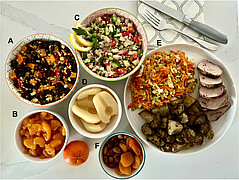"Restore-Diet": Keeping cholesterol, blood sugar and inflammation levels low [29.01.25]
Prof. Stephan Bischoff's team contributed to an international study, recently published in the renowned CELL Journal
Figure from the original publication: One-days’ worth of food consumed by a participant assigned to the 2000 kcal increment based on calculated caloric requirements. Photo depicts menu items from day 4 of the 4-day rotating menu of the restore diet (approximately 46 g dietary fiber): (A) sweet potato and black bean hash and (B) mandarin oranges (breakfast); (C) quinoa tabbouleh salad and (D) canned pears (lunch); (E) baked pork tenderloin, roasted Jerusalem artichokes and potatoes, and coleslaw (dinner); and (F) dried apricots and almonds (snack). Photo by: A.M.A.
In an informative summary on the SWR website, Sabine Schütze describes the effects of the 'Restore Diet' on the gut microbiome and health, which foods are suitable and how to combine them beneficially. More (in German) here....
Original Article in CELL Volume 188, Issue 2:
Cardiometabolic benefits of a non-industrialized-type diet are linked to gut microbiome modulation
Highlights
- The restore diet reduced microbiome diversity but enhanced L. reuteri persistence
- The diet redressed several microbiome features altered by industrialization
- The diet induced beneficial changes to microbiota-derived plasma metabolites
- Cardiometabolic benefits of the diet were predicted by microbiome features
Summary
Industrialization adversely affects the gut microbiome and predisposes individuals to chronic non-communicable diseases. We tested a microbiome restoration strategy comprising a diet that recapitulated key characteristics of non-industrialized dietary patterns (restore diet) and a bacterium rarely found in industrialized microbiomes (Limosilactobacillus reuteri) in a randomized controlled feeding trial in healthy Canadian adults. The restore diet, despite reducing gut microbiome diversity, enhanced the persistence of L. reuteri strain from rural Papua New Guinea (PB-W1) and redressed several microbiome features altered by industrialization. The diet also beneficially altered microbiota-derived plasma metabolites implicated in the etiology of chronic non-communicable diseases. Considerable cardiometabolic benefits were observed independently of L. reuteri administration, several of which could be accurately predicted by baseline and diet-responsive microbiome features. The findings suggest that a dietary intervention targeted toward restoring the gut microbiome can improve host-microbiome interactions that likely underpin chronic pathologies, which can guide dietary recommendations and the development of therapeutic and nutritional strategies.
Graphical abstract
More about Prof. Bischoff's Lab and Research:
Stephan C. Bischoff | For scientific inquiries: Research Focus:
For Patients: |
|---|


